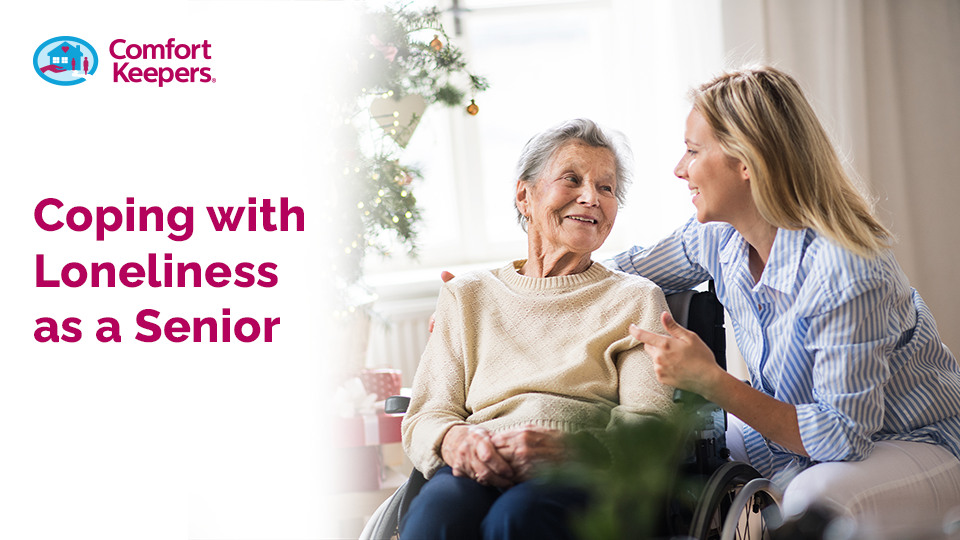
Coping with Loneliness as a Senior
Loneliness can be detrimental to the mind, more so for the elderly who are living in the time after the busying, stimulating activities of their youth. Still, there are strategies for those in senior care to deal with loneliness and isolation, including the role of at-home caregivers who provide companionship.
Research by the National Institute on Aging indicates that social isolation and loneliness lead to a higher risk of mental and physical health conditions, such as high blood pressure, heart disease, a weakened immune system, anxiety, depression, dementia, Alzheimer’s disease, and even death. A fascinating revelation for medical practitioners and professional caregivers is that illness can last longer, and wounds take longer to heal if the person is suffering from isolation and loneliness.
This blog explores this subject by discussing:
How loneliness emerges in later life.
Coping strategies for in-home care seniors.
Things caregivers can do for seniors who are looked after in-home/24-hour home care.
How Loneliness Emerges in later life
As people age, they must reduce the effort they exert. This conserves energy and gives muscles and joints healthy respites. But as stated by the American Society on Aging in their webinar for professional caregivers, loneliness is not a natural aspect of aging. The elderly have a greater risk of experiencing loneliness and social isolation.
The webinar defines isolation as “not having enough people to interact with.” Loneliness is defined as “distress over not having enough social relationships or enough contact with others.” This distinction is very useful: it is accepted by organizations focused on aging and in published research articles. Isolation emerges from a lack of relations or enlivening interactions. Loneliness emerges due to the lack of emotional and mental interaction with like-minds or persons of similar interests.
Therefore, a senior can live in a group facility and still feel isolated. A senior may feel lonely even though they are surrounded by their family on weekends. The webinar goes on to say that twenty-two percent (22%) of Americans say that they always feel lonely. This is directly related to the number of stimulating interactions and relationships they have.
We should not equate social media or workplace activity with feeling fulfilled emotionally. Loneliness can be seen as the opposite of having friendships that stimulate both the heart and mind!
Caregivers who work in 24-hour home care will testify to the limited range of activities or interactions in a household. Most often, they are the primary contact and emotional support for a senior who has at-home care. It’s good to be aware of coping strategies, activities, and technology that ease loneliness and stave off feelings of isolation.
In-Home Care: Coping Strategies for Seniors
Conversations are a great way for caregivers to engage with the elderly person being cared for and discover essential information about how they feel about their environment. You can ask how they feel about their relationships and what may be troubling or worrying them; all of these are indicators of perspective.
Here is a quick list of activities that can enhance a senior’s daily life:
Video chats with out-of-town friends, peers, and family members.
Activities in the Sonora (CA) community.
Hobbies and pastimes that can be done at home (in the in-home care circumstance).
Animal therapy, a pet, or a service animal.
Creating coping strategies or becoming aware of helpful coping mechanisms becomes easier when you identify the underlying thoughts and feelings of a loved one being cared for in-home/24-hour home care. While it is a primary concern of the family to realize whether their elderly loved one has a role to play, that is, being involved in the family’s daily life or weekend activity, seniors ought to be introduced to other seniors too! A great way for a caregiver to promote mental health in their patient is to encourage them to be open to new activities and interact with new people. Identifying persons with common interests facilitates forming bonds, creating purpose in the individual, kindness and affection found in new friendships, and cultivating positive relationships that can last long term.
“Up to 77% of seniors say they’d rather age in place, and around 33% of seniors live alone. But living alone can make patients feel isolated.” – LinkedIn Pulse article: 4 Ways To Help Senior Patients Not Feel Lonely While Aging In Place.
Companionship is as much to do with physical closeness as mental companionship. Park visits, joining in on seniors’ yoga and online classes—even having a low-maintenance pet like a fish or a flowering plant—allows an elderly person the opportunity to speak about themself and their activities. It provides a healthy distance from not doing what they used to do and what keeps them entertained and active in the present.
This also promotes cognition and memory in medical patients who are being treated for dementia and Alzheimer’s. Caring for people in cognitive decline, as it is referred, requires a soft-hand approach, but they would benefit greatly from applying the above suggestions appropriately.
We trust you have enjoyed this informational blog! If you would like more information about senior/elder care, home health care in general, or in-home care Sonora (CA) and other areas, contact the Comfort Keepers office today! We’re also willing to talk to you on the telephone: (209) 213-2693. Dignified care, comfort, and security for your loved one: in-home, 24-hour care, and respite care (for caregivers) available!









